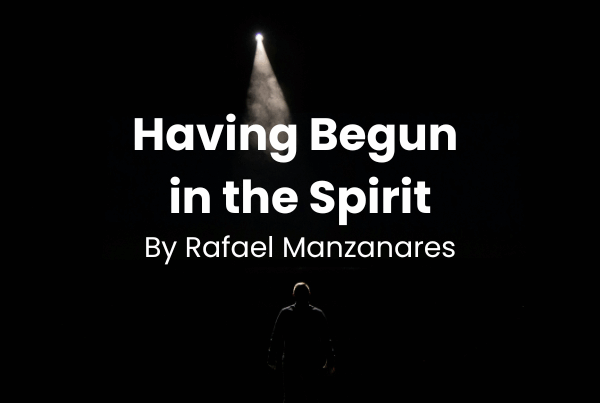
Think back with me to the elementary schoolyard. Any time there was a conflict when I was a kid, the “go-to” self-defense was: “You can’t tell me what to do; this is a free country!” Here in the US, we take pride in our freedom, our constitutional rights that no one can take away from us (Apologies to our international readers for the “Ameri-centric” post, but the principles we will consider transcend national identity). Our rights-entitlement is something that is woven into our psyche from the very foundation of our nation. The second line of the Declaration of Independence is said to be one of the best-known sentences in the English language:
“We hold these truths to be self-evident, that all men are created equal, that they are endowed by their Creator with certain unalienable Rights, that among these are Life, Liberty and the pursuit of Happiness.”
When we read those words, there is something deep within us that sparks up in affirmation, and rightfully so; God-given freedom is something to rejoice over. However, in this article, I would like to pose a question for consideration:
Is standing up for our rights always the right thing to do as a Christ-follower?
In an attempt to answer this question, I would like to first look to our Lord, Jesus Christ. If we as God’s creation have unalienable rights, the God of creation Himself has infinitely more. Jesus, as the eternal Son of God, is rightfully due honor, glory and praise. He has inherent rights to the throne over all creation; He rightfully owns all things. It is His right to execute justice and to demand righteousness. However, the incarnation of Christ is the most radical example of the laying down of rights that the world has ever seen. Jesus laid aside His glory in exchange for humility; He laid aside His honor in exchange for humiliation. He stepped off His throne to be placed in a manger. He sacrificed His heavenly home to dwell in a tent of flesh in the dark and messy world we inhabit. As Paul puts it to the Corinthians:
“For you know the grace of our Lord Jesus Christ, that though he was rich, yet for your sake he became poor, so that you by his poverty might become rich” (2 Corinthians 8:9).
As if it was not enough that Christ laid down His rights as God to become a Man, He then went on to lay down His rights as a Man for our sake. Jesus lived His life on this earth, fully Man, yet without sin. He was the only Man that ever walked this earth in complete innocence, yet at the end of His life, He was betrayed by His friend, falsely accused, put to an unfair trial and condemned to death. He was mocked, tortured and publicly executed despite His absolute innocence. In all of this, you will not once see Jesus defend Himself or demand His right to a fair trial, rather, “He was oppressed, and he was afflicted, yet he opened not his mouth; like a lamb that is led to the slaughter, like a sheep that before its shearers is silent, so he opened not his mouth” (Isaiah 53:7).
In a world that tells us freedom is found in standing up for your rights, the Gospel tells us that Jesus Christ laid down His rights in order to give us true and everlasting freedom.
So, for you and I, brethren, as we face a political climate where many are very fearful that their rights are being increasingly stripped away, how should we respond as Christians? My simple answer would be to let us seek to be like Jesus. That is, after all, what it means to be a Christian isn’t it? We are seeking by the grace of God to follow Christ and to be conformed daily to His image.
When Christ calls a follower, He says, “If anyone would come after me, let him deny himself and take up his cross daily and follow me” (Luke 9:23).
The Apostle Paul writes to the Corinthians about the rights that he has as an Apostle and as a minister of the Gospel. He shows that he was more than willing to lay down his rights for the sake of the Gospel and for the glory of God saying: “Nevertheless, we have not made use of this right, but we endure anything rather than put an obstacle in the way of the gospel of Christ” (1 Corinthians 9:12).
My encouragement is this: May we focus less on our rights and more on showing the radical gospel of grace to an unbelieving world.
Sounds good in theory, but how does this work out practically? Am I saying that we as Christians should compromise our principles? Should we be apathetic in an increasingly godless political and moral climate? If we don’t make a stand for righteousness, what kind of world are we going to leave for our children?
Again, let’s consider Christ Himself. Jesus was far from morally apathetic; He did not for a second compromise righteousness. From His birth, there were many who expected Him to take a political stand against the godless oppression of the Roman Empire, to stand up for the rights of the nation of Israel. But Christ rejected the political path, choosing rather the path of sacrifice and grace. His message was not moralistic or political in nature, rather, He called sinners to come as they are to meet with the God of Mercy to be forgiven and freed from the path of sin that leads to death.
As for the world we will leave our children, as Christ prepared to return to heaven, He spoke of the world He would be leaving the children of God in. He said, “If they hated me they will hate you… If they persecuted me they will persecute you” (John 15:18 and 20b). Biblically, the world will become more godless as the return of Christ draws nearer; and historically, the church has thrived under persecution and has struggled in comfort. Though I completely understand and share in the concern for our children, when we step back and look through the lenses of scripture with the scope of eternity in mind, the words of Christ bring great comfort.
So, practically, I would simply ask that we consider what our primary message is.
What are we preaching on social media, in our conversations with friends and coworkers, from our pulpits and in our community groups at church? Are we standing up for our constitutional rights at the expense of the gospel of grace? Are we so busy boycotting a godless corporation that we forget that the unbelieving world doesn’t need political reform so much as the transforming work of God, through the unconditional forgiveness and love that is found in the Gospel? My dear brothers and sisters, this is not compromise. The Gospel is the power of God and the only message that can bring any lasting change in an individual’s life and in the life of a nation.
Will you allow me to encourage you, next time you feel your rights are being threatened, to seek to be more like Jesus rather than our founding fathers? Don’t let your politics overshadow your gospel witness. Please let your tone be love and your message be grace. In this world of darkness, let’s shine Christ.
This piece was originally posted on June 16, 2016






